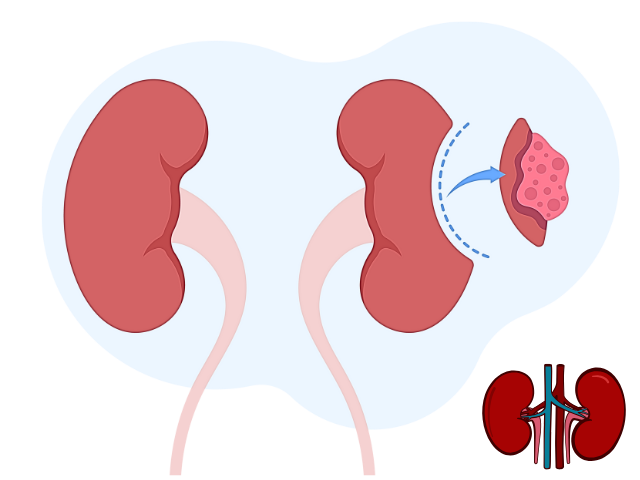Partial nephrectomy, also known as nephron-sparing surgery, is a sophisticated surgical procedure designed to remove only the diseased or damaged portion of the kidney while preserving the healthy tissue. This approach is ideal for maintaining optimal kidney function and is commonly recommended for patients with localized kidney tumours or other specific conditions where complete kidney removal is unnecessary.
At KK Virat Hospital in Karimnagar, we are committed to providing cutting-edge partial nephrectomy procedures with a patient-first approach, ensuring both safety and successful recovery.
Understanding Kidney Function and Damage Timeline
Kidneys perform essential functions such as filtering waste, balancing fluids, and maintaining blood pressure. Damage to the kidneys can occur through various mechanisms:
- Acute Kidney Damage: A sudden onset of damage due to trauma, infection, or obstruction that requires immediate intervention.
- Chronic Kidney Damage: A gradual decline in kidney function over time caused by underlying conditions such as hypertension, diabetes, or polycystic kidney disease.

Who Should Consider Partial Nephrectomy?
Partial nephrectomy is often recommended for individuals with the following conditions:
- Single Kidney Patients: Individuals with a single functioning kidney where preserving kidney tissue is essential.
- Localized Kidney Tumors: Small to medium-sized tumours are confined to one portion of the kidney, allowing for the preservation of healthy tissue.
- Benign Kidney Masses: Non-cancerous growths that may cause pain, obstruction, or other complications.
- Congenital Kidney Abnormalities: Structural defects identified at birth that affect kidney function.
- Trauma-Induced Kidney Damage: Injuries to the kidney that require surgical intervention to remove damaged parts while retaining healthy tissue.
Understanding Kidney Function and Damage Timeline
Kidneys perform essential functions such as filtering waste, balancing fluids, and maintaining blood pressure. Damage to the kidneys can occur through various mechanisms:
- Acute Kidney Damage: A sudden onset of damage due to trauma, infection, or obstruction that requires immediate intervention.
- Chronic Kidney Damage: A gradual decline in kidney function over time caused by underlying conditions such as hypertension, diabetes, or polycystic kidney disease.
Timely diagnosis and appropriate surgical intervention can significantly improve outcomes and preserve kidney function.
Risk Factors for Kidney Conditions Requiring Partial Nephrectomy
Certain factors can increase the risk of kidney conditions that necessitate partial nephrectomy, including:
- Exposure to Toxins: Long-term use of certain medications or exposure to toxic substances.
- Genetic Predisposition: A family history of kidney diseases or cancers.
- Chronic Health Conditions: High blood pressure, diabetes, and other metabolic disorders.
- Frequent Kidney Infections: Recurrent urinary tract infections (UTIs) leading to kidney scarring.
- Lifestyle Factors: Smoking, poor diet, and excessive alcohol consumption contribute to kidney damage.
ICD-10 Codes for Kidney Conditions Requiring Partial Nephrectomy
Accurate medical coding is crucial for proper diagnosis and treatment documentation. Relevant ICD-10 codes include:
- N18.9: Chronic kidney disease, unspecified.
- C64: Malignant neoplasm of kidney, except renal pelvis.
- N28.1: Cyst of kidney, acquired.
- S37.0: Injury of kidney.
- Q61.9: Cystic kidney disease, unspecified.
Pre-Surgery Care
Preparation is key to ensuring a successful partial nephrectomy. Pre-surgery care at KK Virat Hospital includes:
- Comprehensive Medical Assessment: Imaging tests such as CT scans, MRIs, and ultrasounds to assess the kidney condition, along with blood tests and urine analysis.
- Medication Review: Adjusting or temporarily stopping medications that may increase bleeding risks, such as blood thinners.
- Lifestyle Modifications: Encouraging patients to quit smoking, maintain a healthy weight, and follow a balanced diet to improve surgical outcomes.
- Fasting Requirements: Patients are typically required to fast for 8-12 hours before surgery to minimize anesthesia-related risks.
- Preoperative Counseling: Discussing the surgical procedure, potential risks, and expected outcomes to ensure patient readiness.
Diagnosis, Procedure & Recovery
The comprehensive treatment process includes:
- Recovery: Close monitoring post-surgery with regular follow-up appointments to assess kidney function and overall recovery.
- Diagnosis: Utilizing advanced imaging and kidney function tests to determine the exact location and extent of the kidney damage.
- Procedure: Removing only the diseased or damaged portion of the kidney while preserving as much healthy tissue as possible.
Surgical Procedure Overview
Partial nephrectomy can be performed using two primary approaches:
- Open Partial Nephrectomy:
- Involves a larger incision to access the kidney directly.
- Preferred for complex cases, larger tumours, or when minimally invasive surgery is not an option.
- Laparoscopic/Robotic Partial Nephrectomy:
- Involves smaller incisions, offering a minimally invasive approach.
- Benefits include shorter hospital stays, less postoperative pain, and quicker recovery times.
Post-Surgery Expectations
Post-operative experiences may vary, but most patients can expect:
- Mild to Moderate Pain: Managed with pain medication.
- Fatigue and Tiredness: Normal during the initial recovery weeks.
- Catheter or Drain Removal: Temporary drains may be used to prevent fluid buildup.
- Improved Kidney Function: Healthy kidney tissue continues to perform essential functions efficiently.
Post-Surgery Care
Post-operative care is essential for a smooth recovery. Key recommendations include:
- Hospital Stay: Patients may need to stay for 2-4 days, depending on the surgical approach.
- Pain Management: Medications to manage pain and discomfort.
- Wound Care: Keeping incision sites clean and watching for signs of infection.
- Dietary Adjustments: A kidney-friendly diet with low salt and controlled protein intake.
- Gradual Resumption of Activities: Avoid heavy lifting and strenuous activities for at least 4-6 weeks.
Recovery Guidelines After Partial Nephrectomy
To ensure optimal recovery, patients should follow these guidelines:
- Physical Activity: Gradually resuming light physical activities as per medical advice.
- Routine Follow-Ups: Regular medical check-ups to monitor kidney function and healing.
- Stay Hydrated: Drinking sufficient water to aid kidney function.
- Healthy Diet: Incorporating kidney-friendly foods with limited salt and protein.
Advantages of Partial Nephrectomy
Partial nephrectomy offers numerous benefits, such as:
- Improved Quality of Life: Enables patients to maintain a normal lifestyle post-surgery.
- Preservation of Kidney Function: Retains healthy kidney tissue.
- Reduced Risk of Chronic Kidney Disease: Lowers the chances of needing dialysis or transplantation.
- Minimally Invasive Options: Laparoscopic techniques result in smaller scars and faster recovery.
Why Choose KK Virat Hospital for Partial Nephrectomy Surgery in Karimnagar?
KK Virat Hospital stands out for its commitment to exceptional kidney care. Here’s why patients trust us:
- Holistic Approach: Focus on overall well-being and long-term health.
- State-of-the-Art Facilities: Equipped with advanced surgical technology.
- Experienced Surgeons: Highly skilled professionals with extensive expertise.
- Personalized Patient Care: Comprehensive support from diagnosis to recovery.
Book Your Appointment Today
Partial nephrectomy is a vital procedure for preserving kidney function while treating specific kidney conditions. At KK Virat Hospital, Karimnagar, we are dedicated to providing the highest standard of care with a patient-centric approach. Contact us today to learn more about how we can support your kidney health.
- Call Us Directly: Get in touch with our medical coordinators to schedule an appointment with an expert urologist.
- Direct Visit: You can visit our hospital directly by carrying your previous medical records if you have a medical history. However, admission will be based on the doctor’s recommendation.
What is Partial Nephrectomy, and how is it different from a full nephrectomy?
Partial nephrectomy involves removing only the diseased or damaged portion of the kidney, preserving as much healthy tissue as possible. In contrast, a full nephrectomy entails removing the entire kidney. This approach is ideal for smaller, localized tumors or when preserving kidney function is essential.
Who is an ideal candidate for Partial Nephrectomy?
Ideal candidates include individuals with localized kidney tumours, benign masses, or trauma-induced kidney damage. Patients with a single-functioning kidney or those at risk for chronic kidney disease may also benefit from this kidney-sparing surgery.
What types of surgical approaches are used in Partial Nephrectomy?
Partial nephrectomy can be performed via open surgery or minimally invasive techniques such as laparoscopic or robotic surgery. The choice of method depends on the complexity of the case, tumour size, and the patient’s overall health.
How should I prepare for Partial Nephrectomy?
Pre-surgery preparation includes imaging tests (CT, MRI), blood tests, urine analysis, medication adjustments, and lifestyle changes such as quitting smoking. Patients are advised to fast for 8-12 hours before surgery to minimize anaesthesia risks.
Pre-surgery preparation includes imaging tests (CT, MRI), blood tests, urine analysis, medication adjustments, and lifestyle changes such as quitting smoking. Patients are advised to fast for 8-12 hours before surgery to minimize anaesthesia risks.
Like any surgery, simple nephrectomy carries some risks, including infection, bleeding, blood clots, and damage to surrounding organs. However, with modern surgical techniques, the risk is significantly reduced.
What should I expect during the recovery period?
Recovery includes hospital monitoring for 2-4 days, wound care, pain management, and dietary adjustments. Most patients experience mild to moderate pain, and fatigue, and are advised to avoid strenuous activities for 4-6 weeks.
Are there risks or complications associated with Partial Nephrectomy?
As with any surgery, risks include bleeding, infection, injury to surrounding organs, and reduced kidney function. However, these risks are minimized with skilled surgical techniques and comprehensive postoperative care.
How long does it take to return to normal activities after surgery?
Patients can usually resume light activities within 2-3 weeks and return to full normal activities, including work, after 4-6 weeks, depending on the surgical approach and individual recovery.
What is the long-term outlook after Partial Nephrectomy?
Most patients maintain good kidney function post-surgery. Regular follow-ups, imaging, and lab tests help monitor kidney health. A healthy lifestyle with a kidney-friendly diet further supports long-term well-being.
Why is preserving kidney tissue important?
Preserving kidney tissue helps maintain overall kidney function, reducing the risk of chronic kidney disease and the need for dialysis or transplantation. It also improves the patient’s quality of life by retaining natural kidney performance.
Why should I choose KK Virat Hospital for Partial Nephrectomy?
KK Virat Hospital offers state-of-the-art facilities, advanced surgical technology, and highly experienced surgeons. Our patient-centric approach ensures personalized care from diagnosis through recovery, providing excellent outcomes for kidney health.


